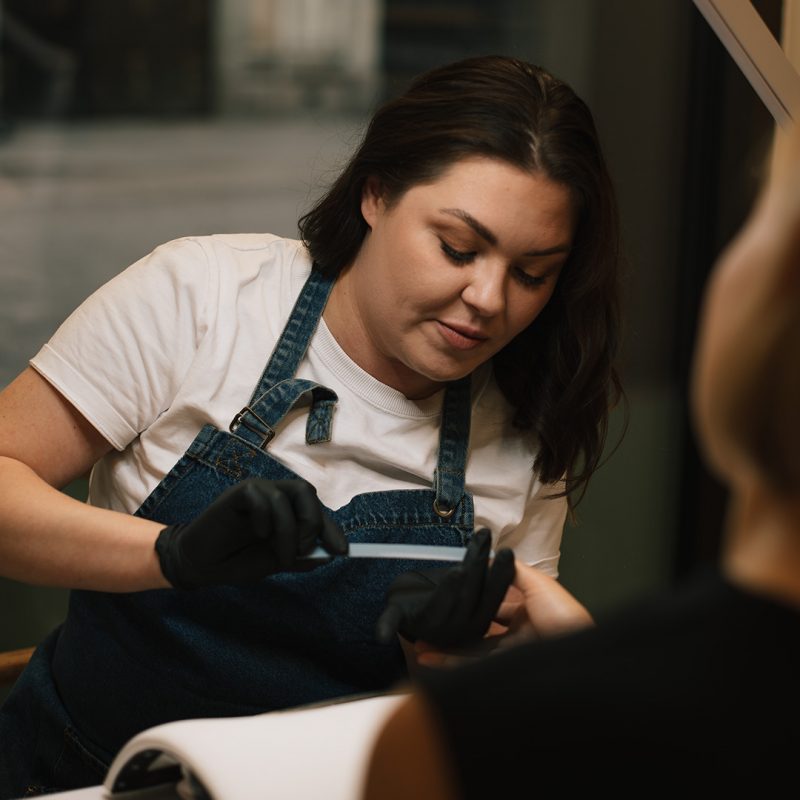Music designer Sannaliisa Ilkka is in charge of the design and implementation of sound concepts and the curation of music lists at Toneco. Ilkka appreciates that sounds resonate in the space they are intended. It is also important that sounds serve their purpose and convey the desired atmosphere. Sound design can reinforce the brand’s identity. Ilkka has created a soundscape for Hotel Mestari based on experientialism, ambition, boldness, and surprise.
According to Ilkka, she breathes music. She has released her music and toured for 10 years as a musician and songwriter in Finland and Europe. After graduating from the Pop & Jazz Conservatory, Ilkka studied sound design at Metropolia. She has always felt an innate vocation for sound and its dramaturgical use.
“Sound is one of the most powerful elements of multisensory experiences. I would describe myself as an advocate of multisensory experience because all senses contribute to a successful experience,” Ilkka says.
“In addition to sound, the sensory experience is created by the ambiance – what something looks like, by the food – what something tastes like, and by the different elements – what something feels like. For example, whether a tablecloth is cotton or plastic. Not forgetting captivating odors,” she describes sensory experiences.
Ilkka creates experiences with sound concepts that uniquely combine music and the sound world. When designing sound concepts, you should always start with the client’s brand, customer base, and the atmosphere you want to bring out. For example, Mestari’s sound concept has been created with the hotel’s four attributes: confidence, craftsmanship, uncompromising and surprising.
“I’ve chosen artists for the Mestari’s playlists who have boldly followed their voice and created something unique. The people who visit Mestari are also masters of their own lives – whatever they do. And when the music resonates with them and makes them feel good, I’ve succeeded and done my job well.”
Music affects emotions
Music can subtly influence people’s emotions and behavior, but you can never fully predict how people will experience music. Ilkka emphasizes that music is a subjective experience for everyone.
“Music is always an emotion. It has an individual impact on the listener’s emotional experience. From these points of view, I also approach my work. For example, I try to create playlists that emphasize the emotions I want to deepen in a particular situation.”
As a sound and music designer, Ilkka’s work includes curating playlists. One of her major missions is to bring new and lesser-known artists to her curated playlists. Ilkka knows what it’s like for indie artists to get their music heard.

“Good music is not always recognized.”
“Poorly perceived music and poor acoustics can ruin a lot of things. For example, if someone feels that the food in a restaurant is just fine but the music is bad, the customer may not return to the restaurant again. They might think the food wasn’t good when in reality the atmosphere was the problem,” Ilkka says.
Ilkka thinks a poorly planned or unplanned music ensemble is more likely to be recognized than a functioning ensemble.
“If Celine Dion plays a riff, it will be noticed. Good background music is rarely recognized but that is how you know it works. When the music is natural, it fits the situation. But this is influenced by the function you want the music to have, so you have to decide whether you want the music to be at the center of the customer experience or just in the background.”
Ilkka herself is constantly observing the music around her.
“I was having dinner once and I realized that there was good music playing. All of a sudden, I noticed it was a playlist I had made,” she laughs.
In addition to the sound concept for Hotel Mestari, Ilkka has also designed a sound concept for Hotel AX, which will open in Jätkäsaari. The sound concepts for both hotels have personal elements and their unique tones.
“Now we don’t want to take the easiest way.”
















